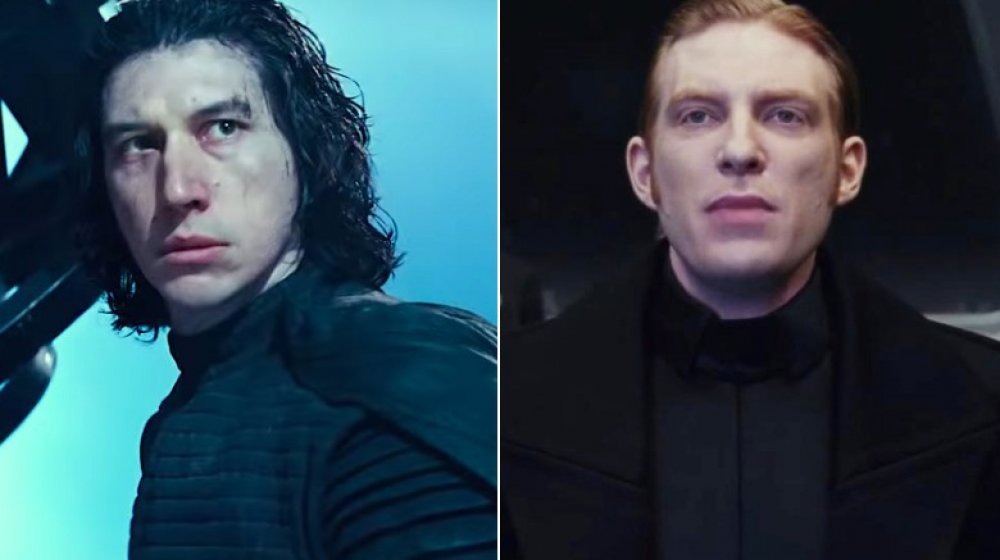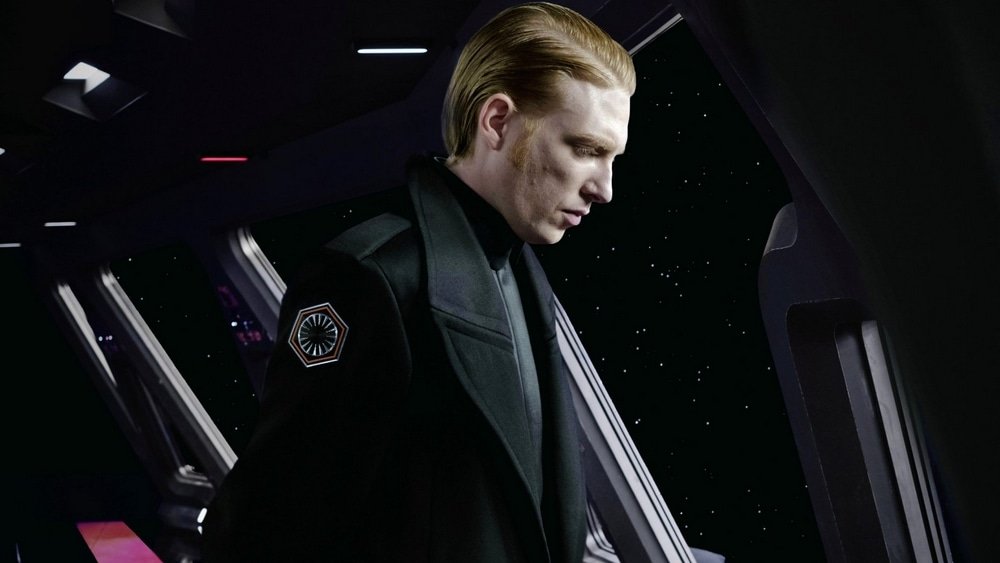The Character Shift That Has Star Wars Fans Flipping Out
Contains spoilers for The Rise of Skywalker
To exactly no one's surprise, director J.J. Abrams' Star Wars: The Rise of Skywalker is proving to be quite the divisive saga-closer. While Star Wars fans are certain to spend the ensuing months, years, and likely decades debating the final state of Reylo, the fate of Carrie Fisher's General Leia Organa, the resurgence of a certain big bad Emperor, and the big secret Finn was dying to tell Rey, it's one of The Rise of Skywalker's lesser twists that has people flipping out.
The twist in question found a certain bad boy of the First Order shifting his allegiance from the power-hungry leadership of the galaxy's new evil Empire in service of aiding the fractured remnants of the Resistance. No, we're not talking about that First Order bad boy — though Kylo Ren's (Adam Driver) surprising character arc will no doubt leave many Star Wars diehards on the fence. The shifty character we're talking about is none other than General Armitage Hux, played by Domhnall Gleeson.
In the film, it's revealed that Hux is the spy within the First Order who has been feeding information to the Resistance so he can make Kylo Ren look unfit for the role of Supreme Leader. As he explains to Resistance fighters Rey (Daisy Ridley) and Finn (John Boyega), "I don't care if you win. I need Kylo Ren to lose." Ultimately, Hux assists the pair — plus expert X-wing pilot Poe Dameron (Oscar Isaac) — in their escape from Kylo's ship. When Hux meets with his new in-house rival Allegiant General Pryde (Richard E. Grant), his cover is blown. Finn may have shot Hux in the leg (per Hux's request, though he did ask to be shot in the arm first) to make it seem like he put up a fight with the Resistance, but Pryde didn't buy it, shooting and killing Hux seconds later.
If you were shocked by General Hux's dramatic shift from First Order true-believer to unscrupulous turncoat, you're not alone. Fans have taken to Twitter to share some colorful responses to Hux's defection, with most reactions applauding the move for being in sync with Gleeson's portrayal of the character as a smarmy little fascist-in-the-making.
Even so, many of those same fans are also deriding Abrams' surprisingly slight treatment of Hux's big reveal, particularly in light of what happens to Hux just moments later. Some fans are even arguing that Abrams missed a major narrative opportunity by not making Hux the central villain of The Rise of Skywalker. To bolster their opinion, those fans are pointing out that both The Force Awakens and The Last Jedi seemed to be setting up a final showdown between Kylo Ren and the impetuous General for supreme control over the First Order, which we know didn't end up happening.
Obviously, Abrams had a much different idea in mind for his saga-closer, opting instead to resurrect the O.G. Star Wars and prequel trilogy's supremely evil Sith Lord Emperor Palpatine (Ian McDiarmid) to carry the villainous load in The Rise of Skywalker. In case you hadn't heard, that particular decision had Star Wars fandom fiercely divided before final chapter of the Skywalker Saga even premiered, and continues to ripple division throughout the Force-friendly ranks.
As it is, fans are left wondering what might've been for Hux had the character been given more of an arc — not to mention wondering how Abrams could be so dismissive of a character who'd previously played a major role in the new trilogy's narrative (see also Kelly Marie Tran's Rose Tico).
Why did General Hux flip sides in The Rise of Skywalker?
Now, if you're currently asking yourself what it was that finally drove General Hux to break ranks from his First Order allies, well, we'd kindly encourage you to go back and rewatch both Abrams' The Force Awakens and Rian Johnson's The Last Jedi, since those two films do build towards some sort of final fight between Kylo Ren and General Hux in The Rise of Skywalker.
Indeed, the seeds of a bitter pseudo-sibling rivalry between Kylo and Hux were sown from the pair's first appearance together in The Force Awakens, with each jockeying throughout the film for affection from their would-be father figure — and First Order figurehead — Supreme Leader Snoke (played mo-cap master Andy Serkis). That all-consuming rivalry was bolstered throughout The Last Jedi, though it eventually found Hux cowering to Kylo's hate-filled command of the Dark Side in the wake of Snoke's truly shocking demise.
On the topic of bitter rivalry and Snoke's untimely demise, it turns out that fans are is also right about Hux's seemingly out-of-the-blue character shift not being all that shocking when one thinks about it. If Hux proved anything over the course of the first two films in the new Star Wars trilogy, it's that he would do damn near anything to prove himself a better leader than Kylo in the eyes of Snoke. In the end, it was ultimately Kylo's murderously definitive power grab (which found Snoke on the wrong end of a light-saber) that likely pushed Hux over the edge and into legit Benedict Arnold territory.
To further complicate matters, when The Rise of Skywalker opens, it seems Kylo Ren has further salted the wound of Hux's embarrassing defeat by installing an elder First Order hot shot General Pryde in a co-leadership role alongside the shamed General, and frequently sides with Pryde on matters of the First Order's militaristic maneuvers. As such, it seems the combination of all of Kylo's spoils and slights are what lead Hux to turn his back on the First Order and start feeding vital information to the Resistance.
But in actuality, Hux never wanted the First Order to fall or the Resistance to win — he just wanted Kylo Ren to lose. That pithy viewpoint — and the self-serving course of action it inspires — is quite possibly the most Hux thing Hux does in the entirety of the new trilogy. Still, we can't help but think that both General Hux (and the brilliant actor who played him) deserved a slightly better send-off in The Rise of Skywalker.

